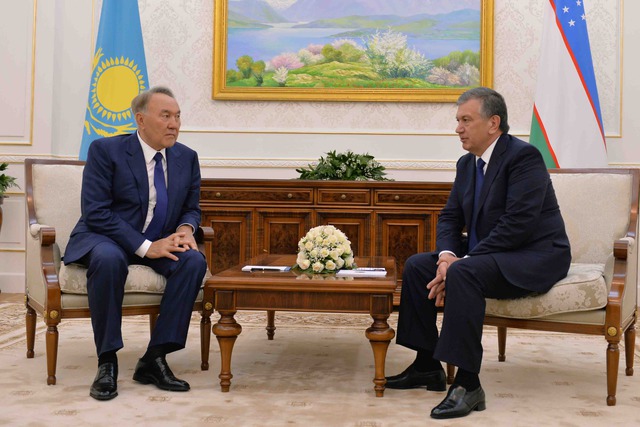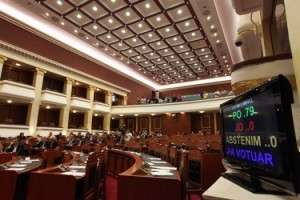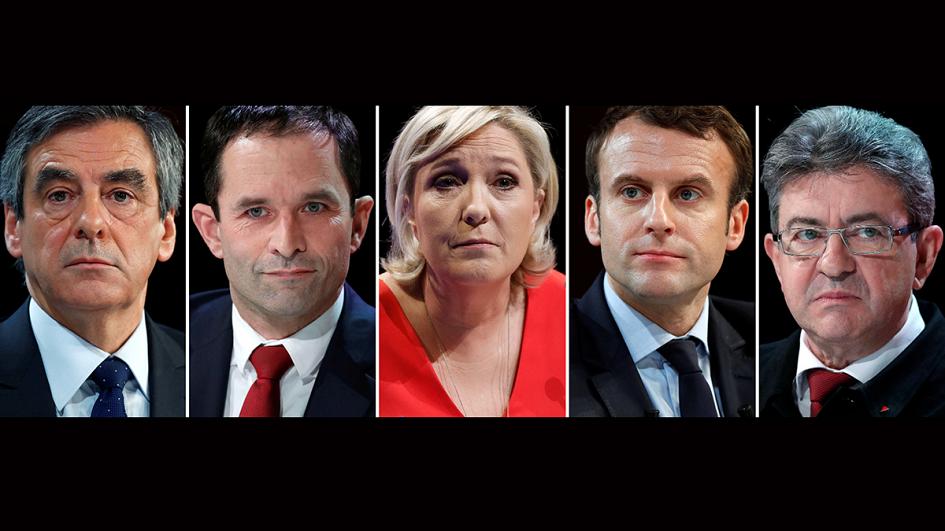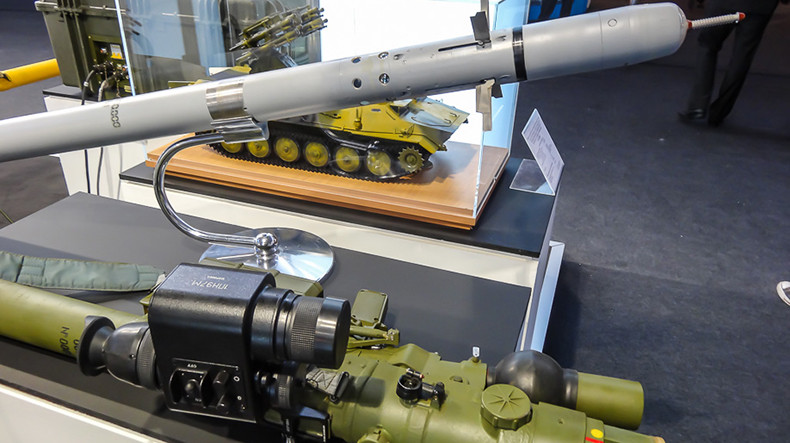
Eurasianet (March 23, 2017)
Kazakhstan’s President Nursultan Nazarbayev has hailed what he described as the fall of barriers dividing his nation and Uzbekistan since the ascent to power of Uzbek leader Shavkat Mirziyoyev.
The two met for a high-spirited talks in Astana on March 23 that focused as much as anything on mutual admiration.
“Only in the last five months, or the fourth quarter of last year, trade turnover between our nations increased by 30 percent on both sides, and that includes new goods. Four trading houses have opened, there is 30 percent more grain, and Uzbek fruit and vegetables deliveries have increased by 25 percent,” Nazarbayev was cited as saying by Tengri News. “This is thanks to how the new leadership in Uzbekistan has open all opportunities to trade and lifted barriers.”
Nazarbayev could barely contain his ebullience.
“There are no unresolved issues between Uzbekistan and Kazakhstan — not territorial, not with the borders, not with politics or the economy. We are free, like a blank page that is to be filled with good deeds that will benefit our nations,” he said.
It is worth recalling that Nazarbayev was an early champion of regional integration in Central Asia — an instinct sniffily mistrusted by Mirziyoyev’s late predecessor, Islam Karimov. Historians of the region may remember that in the wake of the Soviet disintegration, in 1994, Uzbekistan, Kazakhstan and Kyrgyzstan formed the Central Asian Union, which later became the Central Asian Economic Union (1998) and then the Central Asian Cooperation Organization (2001). In no form did the grouping ever become anything more than a talking shop, as Annette Bohr explained in a May 2004 paper.
“The character of this brand of ‘virtual regionalism’ was poignantly illustrated in January 2003 when Uzbekistan unilaterally decided to close its borders with Kazakhstan in order to prevent its residents from buying cheaper goods in Kazakh markets, although CACO leaders had reiterated their intention to strengthen economic cooperation less than a month before at a meeting in Kazakhstan’s capital, Astana,” Bohr wrote.
Nazarbayev showed no recriminations, however.
“The foundations of our relations were laid down by me and the first president of Uzbekistan, Islam Karimov. He was my great friend,” he told Mirziyoyev. “You and I will continue these traditions like brothers, close countries, like good neighbors, helping one another, opening our hearts to another, the embrace of two peoples.”
Getting down to business, Nazarbayev and Mirziyoyev inked 92 commercial agreements worth a total of $840 million during a Kazakhstan-Uzbekistan business forum taking place in Astana.
“At the forum alone, before it closes, there are plans to sign another 10 deals worth $94 million,” said the chairman of Uzbekistan chamber of commerce, Alisher Shaikhov, on March 23.
The hope is for the two countries to increase bilateral trade turnover from $2 billion to $5 billion, Shaikhov said.
According to CA-News website, one firm arrangement is for carmaker GM Uzbekistan to go into partnership with Kazakhstan’s AllurGroup and jointly manufacture the Ravon Nexia R3 model. Under the arrangement, AllurGroup would assemble the cars on a knock-down model at their factory in Kostanay — in other words, put together the kit of parts produced previously in Uzbekistan. While it is not spelled out, this appears like a way for GM Uzbekistan to slip under the net of Eurasian Economic Union-imposed import tariffs.
The plan is initially for AllurGroup to assemble 3,000 units annually, before gradually increasing to 7,000 units.
On the political front, Mirziyoyev and Nazarbayev signed a joint declaration on deepening strategic cooperation and strengthening good-neighborly relations between their countries.
They also signed a Strategy on Economic Cooperation in 2017-2019, agreements on the avoidance of double taxation and additional paperwork intended to ease cross-border road traffic.
The foreign and defense ministries sealed their own agreements for cooperation.
This is Mirziyoyev’s second foreign trip since coming to power, and in a break with tradition, he first dropped in on Turkmenistan, on March 6, instead paying his tributes to Moscow, as Karimov always did after elections.
The choice of destination bears an unmistakeable symbolism and at first glance confirms that Mirziyoyev’s early remarks about wishing to favor regional relationship over those with the larger powers was indeed serious.
No comments yet.
- GREECE STILL MIRED IN BAILOUT DUE TO LACK OF POLITICAL CONSENSUS Europe - EU 24.03.2017
-
 PARLIAMENT CONFIRMS FOUR NEW MINISTERS IN CABINET RESHUFFLE
The Balkans
24.03.2017
PARLIAMENT CONFIRMS FOUR NEW MINISTERS IN CABINET RESHUFFLE
The Balkans
24.03.2017
- UK: TRADE DEALS CHALLENGE Europe - EU 24.03.2017
-
 THE MOST UNPREDICTABLE ELECTION IN FRENCH HISTORY?
Europe - EU
24.03.2017
THE MOST UNPREDICTABLE ELECTION IN FRENCH HISTORY?
Europe - EU
24.03.2017
-
 NSS PROVIDES UPDATE ON IGLA SMUGGLING CASE
The Caucasus and Turkish-Armenian Relations
24.03.2017
NSS PROVIDES UPDATE ON IGLA SMUGGLING CASE
The Caucasus and Turkish-Armenian Relations
24.03.2017
-
25.01.2016
THE ARMENIAN QUESTION - BASIC KNOWLEDGE AND DOCUMENTATION -
12.06.2024
THE TRUTH WILL OUT -
27.03.2023
RADİKAL ERMENİ UNSURLARCA GERÇEKLEŞTİRİLEN MEZALİMLER VE VANDALİZM -
17.03.2023
PATRIOTISM PERVERTED -
23.02.2023
MEN ARE LIKE THAT -
03.02.2023
BAKÜ-TİFLİS-CEYHAN BORU HATTININ YAŞANAN TARİHİ -
16.12.2022
INTERNATIONAL SCHOLARS ON THE EVENTS OF 1915 -
07.12.2022
FAKE PHOTOS AND THE ARMENIAN PROPAGANDA -
07.12.2022
ERMENİ PROPAGANDASI VE SAHTE RESİMLER -
01.01.2022
A Letter From Japan - Strategically Mum: The Silence of the Armenians -
01.01.2022
Japonya'dan Bir Mektup - Stratejik Suskunluk: Ermenilerin Sessizliği -
03.06.2020
Anastas Mikoyan: Confessions of an Armenian Bolshevik -
08.04.2020
Sovyet Sonrası Ukrayna’da Devlet, Toplum ve Siyaset - Değişen Dinamikler, Dönüşen Kimlikler -
12.06.2018
Ermeni Sorunuyla İlgili İngiliz Belgeleri (1912-1923) - British Documents on Armenian Question (1912-1923) -
02.12.2016
Turkish-Russian Academics: A Historical Study on the Caucasus -
01.07.2016
Gürcistan'daki Müslüman Topluluklar: Azınlık Hakları, Kimlik, Siyaset -
10.03.2016
Armenian Diaspora: Diaspora, State and the Imagination of the Republic of Armenia -
24.01.2016
ERMENİ SORUNU - TEMEL BİLGİ VE BELGELER (2. BASKI)
-
AVİM Conference Hall 24.01.2023
CONFERENCE TITLED “HUNGARY’S PERSPECTIVES ON THE TURKIC WORLD"









